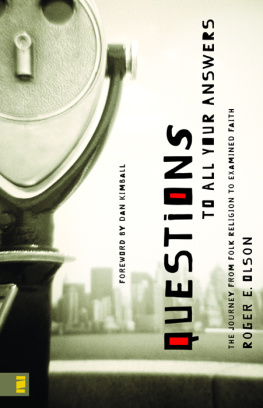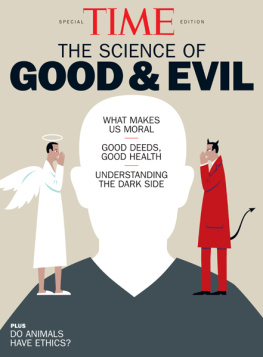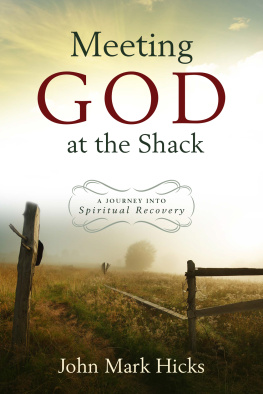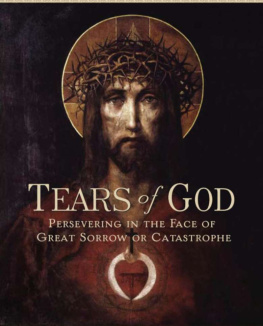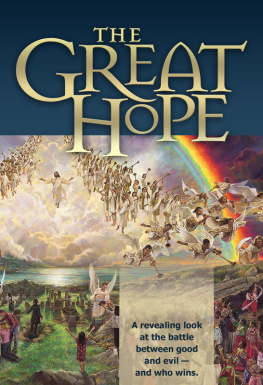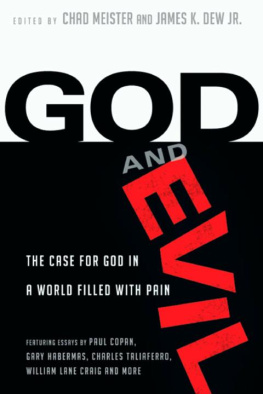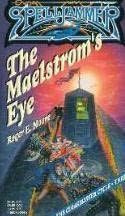1

Why a Book About the Shack?

Everyone who has ever felt a great sadness, or who knows someone who has, can relate to The Shack . This novel is about the Great Sadnessthe terrible burden of grief that often accompanies and follows a devastating loss. It may be the death of a loved one. It may be financial ruin. It may be divorce or abandonment. Whatever its cause, the Great Sadness is part of the human condition.
People often ask Where is God? when pressed down by the Great Sadness. Where was God when my husband or wife died? Where was God when my brother was killed in a car accident, leaving behind a young family? Where was God when a storm destroyed my town, including my home? Where was God when terrorists attacked and killed so many people?
Probably no question about God disturbs Christians and non-Christians more than this one: How can an all-good, all-powerful God cause or even allow such horrible loss of human life? How can a God of love allow the departure of someone I love so dearly? Especially if that departure involves pain and suffering, and leaves wreck and ruin in its wake. These questions cause people to wonder about Gods character. This is probably why The Shack by William P. Young has sold millions of copies, and almost every copy is being read by two or three people. It speaks to these questionsespecially the question of Gods characterin a powerful way.
The Shack reminds me of the popular television series Touched by an Angel . Both delve into some pretty deep waters about God, suffering, evil and free will without mentioning any theologian, Christian church or doctrinal tradition. And in that way The Shack too appeals to our postdenominational culture.
While The Shack is overtly Christian, those who dont share the Christian faith can and do find it enjoyable. But it seems to be aimed primarily at a Christian audience. And its purpose, beyond spinning an amazingly good yarn, seems to be to correct certain popular notions about God and point readers toward other ideas about God. There can be no doubt that William Young is theologically trained, but he hides most of that well. The reader isnt assaulted by heavy theological jargon but is sweetly seduced into some profound theological thinking.
Before we begin looking at The Shack in detail, Ill give a synopsis of the plot. Any who havent read the book should consider putting this book down and reading The Shack first. (It will probably only take a few hours. My wife couldnt put it down until she finished it.)
Spoiler alert! Im going to give away the ending very soon.
A Synopsis
The hero of the story is God, to be specific, Jesus. But the protagonist is Mack. And like many people Mack lives with the burden of the Great Sadness. The story begins with an account of Macks personal history. He was raised in an abusive home, where his father, a very religious man, beat him severely many times. Later he attended seminary for a while but didnt especially relate to what he was taught there. One thing he was taught is that God doesnt speak anymore; he stopped directly communicating with people after the Bible was written. Mack married his sweetheart Nan. They live in Oregon and have five unusually beautiful kids. The youngest one is Missy, a sweet child especially precious to Mack.
Mack takes his three youngest children on a camping trip in the Oregon wilderness. While Mack and everybody else are struggling with a capsized canoe in the nearby lake, Missy disappears. After frantically searching for Missy, Mack and other campers finally realize, based on some irrefutable evidence, that she has been kidnapped. The authorities never find her body but discover her bloody dress in an old shack near the lake.
The Great Sadness descends on Mack and engulfs him. Apparently he falls into a deep depression during which he is tempted to accuse God and himself for Missys fate. But one day he finds a note in the family mailbox. It says, Mackenzie [Macks first name], Its been a while. Ive missed you. Ill be at the shack next weekend if you want to get together. The note is signed Papa, which is Nans favorite name for God.
Mack sneaks off to the shack where Missys bloody dress was found to see if Papa (God) will show up. Hes dubious about that possibility and suspects hes the victim of a hoax, but his desperation drives him to try anything. While hes at the shack, God does show upin the form of a jolly, rather large black woman, whom he discovers is Papa. Then Mack encounters a friendly carpenter, Jesus, and a wispy young female figure called Sarayu, who is obviously the Holy Spirit. These three engage Mack in conversation about his life, Missys murder and Gods role in human events.
The four characters chop wood, explore the beauty of Gods creation, cry together, talk about life and death, lie on the dock at night looking up at the starry sky and go for long hikes that lead to some pretty startling places. The bulk of the book narrates Macks time with God at the shack. It would be easy to suppose this was all a dream. But the books ending reveals it was not meant to be a dream. We are supposed to believe that God really appeared to Mack as a trinity of three distinct people bound together in a community of perfect love. Papa, Jesus and Sarayu take Mack on a journey to understand why terrible things happen to human beings and what God has to do with it. The point of it all is that God is worthy of trust, and we shouldnt judge God.
After some agonizing but enlightening conversations with God, Mack is allowed to see Missy through a waterfall. The veil between earth and paradise, as it were, is made thin by God so they can see each other, but they cant touch or talk to one another. Mack observes that Missy is happy where she is, and God assures him that even in her darkest hour her thoughts and prayers were mainly for him, his wife and Missys siblings.
Mack also gets a wider vision of heaven as thousands of souls appear in a meadow at night. They look to Mack like multicolored lights. And he sees angels and other heavenly beings, including a majestic Jesus. During this event (whether vision or reality) Mack encounters his abusive father and they embrace tearfully. Mack forgives his father just as the heavenly Father has forgiven him. God tells Mack that everyone is already forgiven because of what Jesus did on the cross, but that people have to accept forgiveness for it to benefit them. Apparently, at some point Macks father accepted Gods forgiveness, because he is among the heavenly host.
Finally, God leads Mack on a long hike to find Missys body. They extract it from a cave where the murderer had put it and take the body back to the shack, where Jesus has finished a beautiful casket. They lay the body carefully in the casket and bury it. By now Mack has come to terms with his daughters death and is no longer angry at God or himself. The Great Sadness has lifted from his shoulders.
Mack returns from his encounter with God and tells his wife. Nan is surprised but believes him. Together and with a friendly policeman they know, they go to the cave and retrieve Missys body for proper burial. This raises questions about how real the encounter between God and Mack was supposed to be. If God and Mack had already retrieved Missys body, why was it back in the cave? That makes Macks experience sound more like a vision or dream. But apparently were not supposed to think it was either of these.
The Shack Rings True
I believe The Shack is more than a religious novel; it is a true story. Its not true in the sense that I believe the events described actually happened but in that the story basically fits human experience and what the Bible says. Like Jesus parables, such as the Prodigal Son and the Good Samaritan, The Shack is teaching us something. Its supposed to teach that life is tough but we can trust God anyway. It teaches us something about Gods character and his relationship with the world of pain and misery. Maybe its supposed to teach that life is arbitrary, but God is not. Very bad things happen to everyone, but God is not out to get us, and even in the midst of the very worst pain imaginable he is there with those who suffer.


